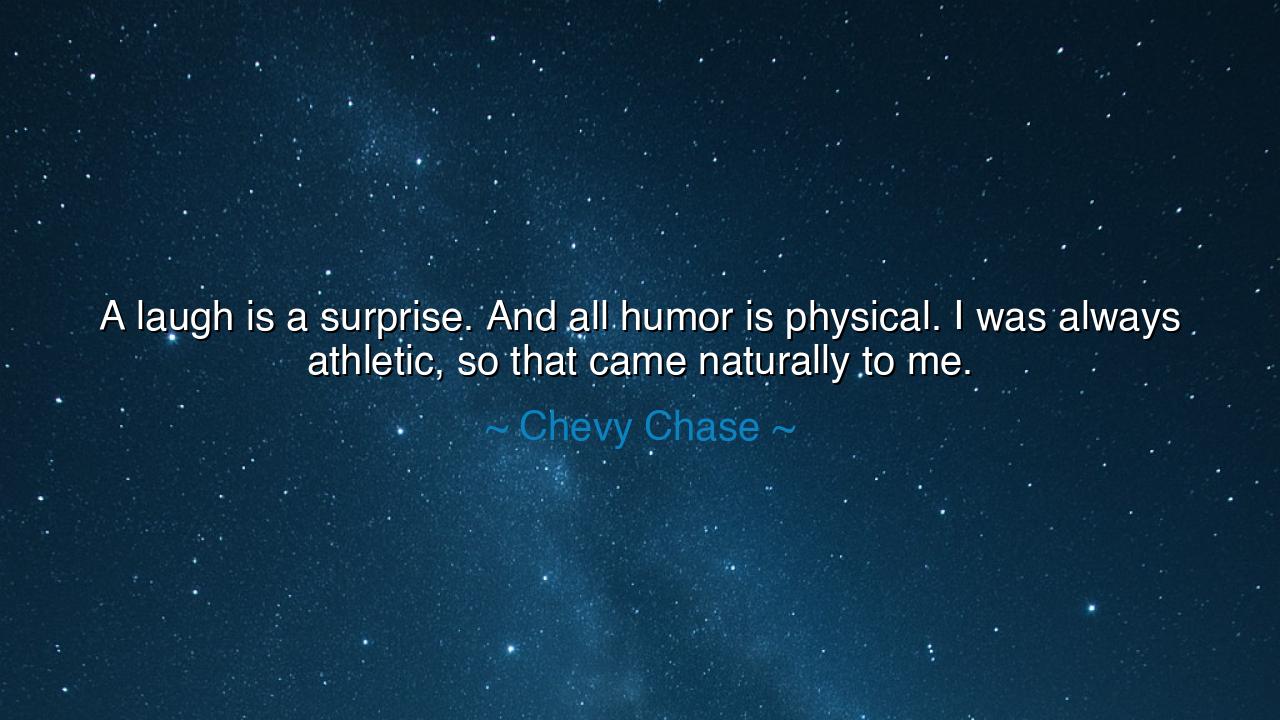
A laugh is a surprise. And all humor is physical. I was always
A laugh is a surprise. And all humor is physical. I was always athletic, so that came naturally to me.






In the realm of laughter and performance, the jester becomes a kind of sage, and the clown a philosopher of the soul. So spoke Chevy Chase, one of the great bringers of laughter in the modern age: “A laugh is a surprise. And all humor is physical. I was always athletic, so that came naturally to me.” These words, though simple, carry the rhythm of truth. They remind us that laughter is not merely of the mind—it is born of motion, of suddenness, of life bursting forth in unexpected ways. The surprise he speaks of is the lightning strike of joy that startles the spirit awake, and the physicality is the thunder that follows, shaking the body into laughter.
From the earliest days of humankind, when tribes gathered around the fire, it was movement that stirred mirth. The first jesters did not wield clever words but gestures—the stumble, the fall, the mimicry of the proud brought low. The ancients knew what Chase reveals anew: that humor lives in the body before it rises to the lips. It is the sudden twist, the imbalance that becomes grace, the accident that reveals a deeper order. To laugh is to feel surprise ripple through the flesh, to be reminded that we are not machines of thought but living creatures of pulse and breath.
Observe how the surprise of laughter works upon the heart. It comes unbidden—no one can plan a laugh, for then it vanishes. It seizes us, like a spirit descending from the heavens. The rigid face softens, the lungs convulse, and the soul is shaken free from solemnity. That is why Chase’s insight holds such power: he understood that laughter begins not in cleverness but in motion—in the unexpected physicality of life. It is the trip that becomes dance, the pause that becomes punchline, the stillness that suddenly explodes into delight.
Remember the tale of Charlie Chaplin, the eternal wanderer with the bowler hat. He was not merely funny—he was poetry in motion. In The Tramp, he turned slips, tumbles, and chases into sacred theater. When he stumbled, the world laughed, but behind that laughter was recognition: we, too, stumble. We, too, fall and rise again. Chaplin’s genius was physical; he moved like a dancer and taught us that the human body itself is an instrument of humor. His athletic grace—like Chase’s—revealed that laughter is born when movement meets surprise, when chaos turns to rhythm, when failure becomes art.
Even in the noble traditions of the stage and the battlefield alike, surprise commands attention. The warrior who moves unpredictably conquers; the performer who surprises awakens the soul. The same energy that drives a sword stroke or a leap across the chasm drives the body that slips upon a banana peel and turns it into joy. Humor and heroism, both, require daring—the courage to act, to move, to embody risk. The gods themselves, in their divine play, are said to laugh when mortals move with unexpected grace.
Thus, the teaching of Chase is not confined to the stage—it is a wisdom for life. Be alive in your movement. Let your spirit surprise itself. The body, when allowed to flow freely, will create laughter without effort. Do not fear foolishness; the fool is often the freest of men. Those who are too guarded, too stiff, cannot laugh, for they have imprisoned their bodies in caution. But the one who allows life to move through him—whether through dance, sport, or play—becomes a vessel for joy itself.
So, children of tomorrow, train not only the mind but the body, for humor dwells in both. Walk with agility, move with courage, live with the readiness to fall and rise again. See in every stumble a chance to awaken laughter, in every surprise a doorway to joy. Remember that to laugh is to be touched by life’s divine unpredictability. As Chase reminds us, humor is physical, and a laugh is a surprise—so keep yourself ready to move, ready to be caught off guard, ready to feel alive. For the spirit that welcomes surprise, and the body that moves with freedom, shall never grow old.






AAdministratorAdministrator
Welcome, honored guests. Please leave a comment, we will respond soon